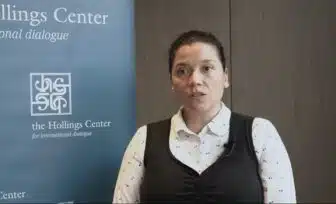ASEAN and the Myanmar Crisis - Lina Alexandra
In the video, Lina Alexandra discusses the urgency and importance of addressing ASEAN and the Myanmar crisis, warning that ASEAN’s credibility and regional relevance are on the line. She argues that if ASEAN cannot help resolve the ongoing conflict or at least halt the violence and guide Myanmar toward a peaceful, stable transition, it risks becoming ineffective. Beyond regional responsibility, she highlights the global stakes, emphasizing that Myanmar has become a source of non-traditional security threats—including telecommunications scams, drug trafficking, environmental damage, and human trafficking—that affect countries far beyond Southeast Asia. Resolving the crisis, she asserts, would not only strengthen ASEAN’s position but also reduce a significant global burden.
Lina Alexandra further stresses Thailand’s key role in the crisis due to its long, shared border with Myanmar and its position as a primary recipient of Myanmar refugees. With approximately 10% of Myanmar’s population now in Thailand—making up a tenth of Thailand’s own population—the humanitarian and economic strain is significant. While Thailand has managed the influx so far, Lina warns that without sustained international assistance, its ability to cope will diminish. She calls on the international community to recognize that the fallout from the Myanmar crisis is not isolated; rather, it is deeply interconnected with broader global stability and demands a collective, sustained response.
This video was filmed during the Hollings Center’s dialogue program Myanmar and Southeast Asia:
Challenges and Opportunities in Regional Relations, which occurred in February 2025.
Speaker Biography
Lina Alexandra is the Head of the Department of International Relations at the Centre for Strategic and International Studies (CSIS), one of Indonesia’s leading think tanks based in Jakarta. Her research focuses on Indonesian foreign policy, regional security, conflict resolution, human rights, and the prevention of mass atrocities. She also serves as the coordinator of the CSIS Myanmar Initiative Programme and has written extensively on Indonesia’s and ASEAN’s roles in addressing the Myanmar crisis. In addition, Lina is a research fellow at the Asia-Pacific Centre for Responsibility to Protect (APR2P) at the University of Queensland, where she leads activities in Indonesia under the Asia-Pacific Network for Atrocities Prevention (APPAP). She earned both her PhD (2020) and master’s degree (2006) in international studies from the University of Queensland. Her recent publications cover topics such as hate speech prevention in Indonesia and Indonesia’s contributions to peacebuilding and human security in the region.


